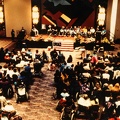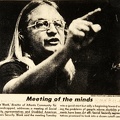ANNIVERSARY ISSUE 15TH ANNIVSERSARY ISSUE
[image] drawing of a wheelchair
April 29, 1987
[Headline] Wheels of Fortune
[Subheading] Michael Smith finally found justice for the disabled this spring-twelve years after his death.
By Frank Hogan
(Wade) Blank sat with Smith from midnight to morning during his last months. The Atlantis office was set up in the living room of Smith's apartment, and Blank would write down the poetry of Smith composed in his head. Poems like this:
TO TED
I woke up on a cold evening
And found you
Sitting beside my bed.
You looked into my eyes
And I saw that death was on its way.
You grabbed my hand
And put your head on my chest.
And began to sob.
And all I could do
Was put my hands in your hair
And cry
Until my heart was sore
I tried to calm your soul
And this seemed strange, in a way,
Because I was the one
Who was dying.
This memory
Of you letting your tears flow,
Letting me see the real you,
Will remain deep within my heart.
Smith died in his Atlantis Community apartment on October 1, 1975. His mother was at his bedside. He'd had plenty of time to plan his funeral; Blank conducted the service at Olinger's (which was wheelchair accessible), friends read Smith's poetry poetry and Joe Cocker's "You Are So Beautiful" played. Afterward everybody drove up to the Tollgate in Central City and got loaded.
Smith was at rest, but his ghost would haunt the courts for twelve more years.
Wade Blank would probably puke at the idea, but the Atlantis Community disabled rights activist is the closest approximation to a saint that I encountered while writing stories for Westword.
Blank was instrumental in creating the Atlantis Community. He was constantly at Michael Patrick Smith's bedside during the former muscular dystrophy poster child's final days. That was after Smith moved out of a nursing home and into an apartment and filed a lawsuit against Heritage House for violating his civil rights and denying him the care he was entitled to under the Medicaid Act.
But it wasn't Blank's tenacity in pursuing the lawsuit for over a dozen years and to a victory on Smith's behalf that most impresses me. Blank's utter fearlessness is what's amazing. In the early years of Atlantis' development, Blank's van was torched, a cinderblock was hurled through his living room window and he was continually threatened and harassed. Through all the obstacles, Blank kept shepherding the disabled rights movement forwards.
On July 5, 1978, Blank and nineteen disabled activists in wheelchairs blocked buses at the corner of Broadway and Colfax, demanding wheelchair access to public transportation. Since then they've traveled to major cities throughout the U.S. and Europe, performing acts of civil disobedience to make their point. Twelve years after that historic night in downtown Denver, President George Bush signed legislation guaranteeing the disabled equality in the workplace and ordering all public transportation to be wheelchair-accessible. "A few weeks ago, the City of Denver erected a plaque to commemorate that protest," says Blank. "Next time you're down at Colfax and Broadway, take a look at it. The tourist bureau put out a brochure listing it as a sight to see in Denver."
Blank isn't resting on his laurels, though. In October, he'll be in San Francisco, leading 400 wheelchair activists as they try to shut down the national nursing home administrators' convention. "We're going to lock all the doors at the Moscone Center and let them know what it feels like to be locked in a nursing home," Blank says. "Then we'll hit California Clinton headquarters unless we get a position paper by October 1 spelling out that if he's elected, Clinton can and will implement a national attendant service program."
That program is Blank's main focus these days. "We need to rethink nursing homes," he says. "The patient is a commodity. You can talk quality care, but when you're a commodity you're not really talking about humanity. It's like saying we want o have nice clean barns before we slaughter the cattle. It's not bad service, it's the system."
That's another thing I like about Blank: He's not afraid of hyperbole. His only fault is that he's a Cleveland Browns fan. He stand up to the system and wins. He embodies everything that was good about the Sixties, with a Nineties addition: Blank has a publicity coordinator in Hollywood. Michael Smith's story was made into a television movie a few years ago, and Blank is talking to Quantum Leap producers about dramatizing the 1978 standoff in downtown Denver.
And still Blank defects all credit to disabled activists. Even the PR agent furthers the cause of the Atlantis Community rather than Blank's personal triumphs. "Mike [Smith] is the acorn of the oak tree, says Blank. "He left quite a legacy."
Blank's leaving quite a legacy himself.
Westword 9/2/93
- Created on
- Wednesday 24 July 2013
- Posted on
- Wednesday 9 October 2019
- Visits
- 163
- Rating score
- no rate
- Rate this photo


0 comments